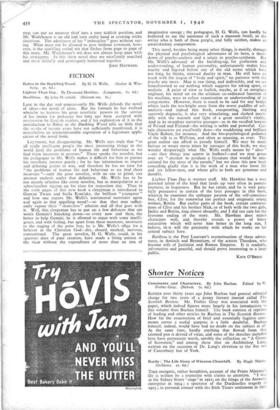FICTION
LATE in the day and unnecessarily Mr. Wells defends the novel of ideas—his novel of ideas. But the formula he has evolved whereby to harness his great novelistic powers to the service of his mania for pedagogy has long ago been accepted with resignation by English readers, and if his explanation of it in the introduction to Babes in the Darkling Wood tells us little that the works of twenty years have not sufficiently manifested, it is nevertheless an unexceptionable exposition of a legitimate appli- cation of the novel form.
Leg.timate, but disappointing. Mr. Wells says truly that " to all really intelligent people the most interesting things in the world [are] the problems of human life and behaviour as we find them incarnate in persons." There speaks the novelist, but the pedagogue in Mr. Wells makes it difficult for him to pursue his novelistic interest purely ; for he has information to impart and debating points to win, and therefore he has no time for " the problems of human life and behaviour as we find them incarnate "—only the poor novelist, with no axe to grind, can attempt analysis under that definition. Mr. Wells has to be not merely selective like every novelist, but as manipulative as a schoolteacher rigging up his class for inspection day. Thus in the early pages of this new book a. clergyman is introduced to Gemini Twain and Stella Kentiake, the brilliant " youngster " and how one regrets Mr. Wells's sentimental surrender again and again to that appalling word !—so that they may suffici- ently expose their " shameless " atheism and all that goes with it. Well, this clergyman has to put up a few defences that are worth Gemini's knocking down—so every now and then, the better to help Gemini, he is allowed to argue with some intelli- gence, and with feeling, but apart from these moments, necessary to the staging of the prize boy, he is Mr. Wells's effigy for a believer in the Christian . God—dry, absurd, marked, nervous, conventional. The great novelist, H. G. Wells, could, in his spacious days of pure creation, have made a living person of the vicar without the expenditure of more than an iota of
imaginative energy ; the pedagogue, H. G. Wells, can hardly be bothered to see the existence of such a museum fossil; so the writer who is both of these people, and fully neither, makes an unsatisfactory compromise.
This novel, besides being many other things, is mainly, through the physical and psychological adventures of its hero, a show- down of psycho-analysis and a salute to psycho-synthesis. But Mr. Wells's advocacy of the building-up, for perfection and understanding, of human personality, Unfortunately makes him touchy and bigoted before any of the old terms which have too long, he thinks, stressed duality in man. He Will have no truck with the jargon of " body and spirit," no patience with the psyche any more. Man is one thing, and indivisible, and we are henceforward to say nothing which suggests his taking apart, or analysis. A point of view as foolish, maybe, as if an aeroplane engineer, his mind set on the ultimate co-ordinated function of his machine, were to refuse examination or understanding of its components. However, there is much to be said for any bridge whicn leads the too-bright away from the worse puddles of self- analysis—and indeed this book, exasperating, limiting and narrowly dogmatic, is also very stimulating, and slashed inevit- ably with the warmth and light of a great novelist's vitality. And in its straighter narrative passages—as in the recalled horrors of Poland and Finland—the writing is noble and powerful. Cer- tain characters are excellently done—the maddening and brilliant Uncle Robert, for instance. And the bio-psychological pedantry of the talk is as Wellsian, and often as amusing, as ever. This great author can afford to parody himself. We may be made furious or weary many times by passages of this book; we may wonder despairingly what Mr. Wells really means by " ideas " —are they things you scatter in leaflets?—and we may groan over an " attempt to produce a literature that would be edu- cational for the mass of the people," but we close this new book conceding gladly that it is the work of a man who loves life and iris fellow-men, and whose gifts to both are generous and durable.
Lighter Than Day is warmer stuff. Mr. Hawkins has a very personal talent of the kind that lands up very often in porten- tousness, in bogusness. But he has talent, and he is very pain- fully persuasive in certain of the later passages in this book, wherein he examines the unhappy passion of the self-conscious boy, Clive, for the somewhat too perfect and enigmatic young woman, Benita. But earlier parts of the book, certain conversa- tions of Clive and his brother Nick, or of both with the two girls, Jackie and Benita, ring almost absurdly, and I did not care for the tiresome ending of the story. Mr. Hawkins does minor characters well, and thereby reveals a power of bitter naturalism which will serve him better in the long run, I believe, th-n will the preciosity with which he works on his central subject here.
Basilissa is the Poet Laureate's reconstruction of three adven- tures, in Antioch and Byzantium, of the actress Theodora, who became wife of Justinian and Roman Empress. It is readable, informative and graceful, and should prove interesting to a large public.
KATE O'BRIEN.






































 Previous page
Previous page